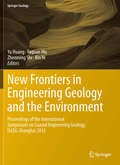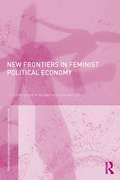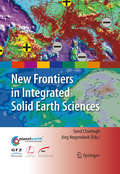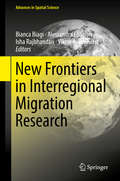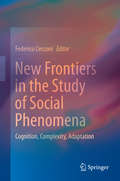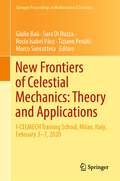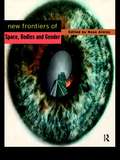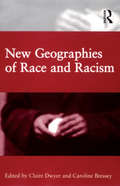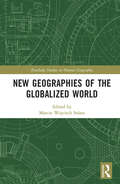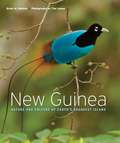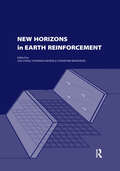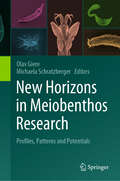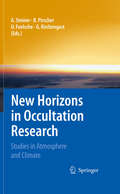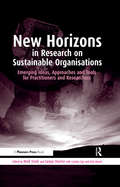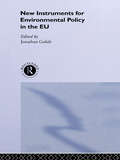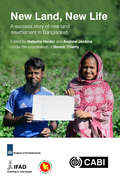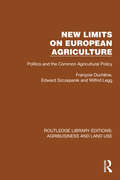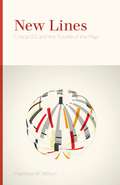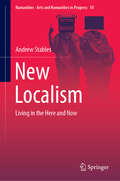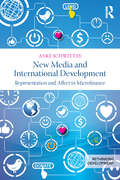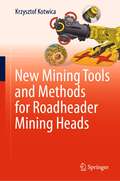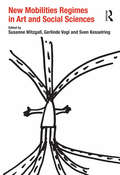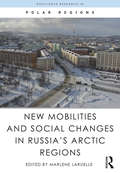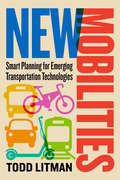- Table View
- List View
New Frontiers in Engineering Geology and the Environment: Proceedings of the International Symposium on Coastal Engineering Geology, ISCEG-Shanghai 2012 (Springer Geology #9)
by Bin Ye Yu Huang Faquan Wu Zhenming Shi“New Frontiers in Engineering Geology and the Environment” collects selected papers presented at the International Symposium on Coastal Engineering Geology (ISCEG-Shanghai 2012). These papers involve many subjects – such as engineering geology, natural hazards, geoenvironment and geotechnical engineering – with a primary focus on geological engineering problems in coastal regions. The proceedings provide readers with the latest research results and engineering experiences from academic scientists, leading engineers and industry researchers who are interested in coastal engineering geology and the relevant fields. Yu Huang works at the Department of Geotechnical Engineering, Tongji University, China. Faquan Wu works at the Institute of Geology and Geophysics, Chinese Academy of Science, China and he is also the Secretary General of the International Association for Engineering Geology and the Environment. Zhenming Shi works at the Department of Geotechnical Engineering, Tongji University, China. Bin Ye works at the Department of Geotechnical Engineering, Tongji University, China.
New Frontiers in Feminist Political Economy: New Frontiers In Feminist Political Economy (Routledge IAFFE Advances in Feminist Economics)
by Shirin M. Rai Georgina WaylenThis volume brings together the work of outstanding feminist scholars who reflect on the achievements of feminist political economy and the challenges it faces in the 21st century. The volume develops further some key areas of research in feminist political economy – understanding economies as gendered structures and economic crises as crises in social reproduction, as well as in finance and production; assessing economic policies through the lens of women’s rights; analysing global transformations in women’s work; making visible the unpaid economy in which care is provided for family and communities, and critiquing the ways in which policy makers are addressing ( or failing to address) this unpaid economy.
New Frontiers in Integrated Solid Earth Sciences
by Jorg Negendank S.A.P.L. CloetinghMan's intensifying use of the Earth's habitat has led to an urgent need for scientifically advanced 'geo-prediction systems' that accurately locate subsurface resources and forecast the timing and magnitude of earthquakes, volcanic eruptions and land subsidence. As advances in the earth sciences lead to process-oriented ways of modeling the complex processes in the solid Earth, the papers in this volume provide a survey of some recent developments at the leading edge of this highly technical discipline. The chapters cover current research in predicting the future behavior of geologic systems as well as the mapping of geologic patterns that exist now in the subsurface as frozen evidence of the past. Both techniques are highly relevant to humanity's need for resources such as water, and will also help us control environmental degradation. The book also discusses advances made in seismological methods to obtain information on the 3D structure of the mantle and the lithosphere, and in the quantitative understanding of lithospheric scale processes. It covers recent breakthroughs in 3D seismic imaging that have enhanced the spatial resolution of these structural processes, and the move towards 4D imaging that measures these processes over time. The new frontier in modern Earth sciences described in this book has major implications for oceanographic and atmospheric sciences and our understanding of climate variability. It brings readers right up to date with the research in this vital field.
New Frontiers in Interregional Migration Research (Advances in Spatial Science)
by Bianca Biagi Alessandra Faggian Isha Rajbhandari Viktor A. VenhorstThis book focuses on the latest advances and challenges in interregional migration research. Given the increase in the availability of "big data" at a finer spatial scale, the book discusses the resulting new challenges for researchers in interregional migration, especially for regional scientists, and the theoretical and empirical advances that have been made possible. In presenting these findings, it also sheds light on the different migration drivers and patterns in the developed and developing world by comparing different regions around the globe. The book updates and revisits the main academic debates in interregional migration, and presents new emerging lines of investigation and a forward-looking research agenda.
New Frontiers in the Study of Social Phenomena: Cognition, Complexity, Adaptation
by Federico CecconiThis book studies social phenomena in a new way, by making judicious use of computer technology. The book addresses the entire spectrum of classic studies in social science, from experiments to the computational models, with a multidisciplinary approach. The book is suitable for those who want to get a picture of what it means to do social research today, and also to get an indication of the major open issues. The book is connected to a database of code for simulations, experimental data and allows to activate a subscription to a teaching tool using NetLogo, a programming language widely used in the social studies. The authors are researchers with first-hand experience research projects, both basic and applied. The work will be useful for those who want to understand more of the social, economic and political phenomena via computer applications.
New Frontiers of Celestial Mechanics: I-CELMECH Training School, Milan, Italy, February 3–7, 2020 (Springer Proceedings in Mathematics & Statistics #399)
by Giulio Baù Sara Di Ruzza Rocío Isabel Páez Tiziano Penati Marco SansotteraThis volume contains the detailed text of the major lectures delivered during the I-CELMECH Training School 2020 held in Milan (Italy). The school aimed to present a contemporary review of recent results in the field of celestial mechanics, with special emphasis on theoretical aspects. The stability of the Solar System, the rotations of celestial bodies and orbit determination, as well as the novel scientific needs raised by the discovery of exoplanetary systems, the management of the space debris problem and the modern space mission design are some of the fundamental problems in the modern developments of celestial mechanics. This book covers different topics, such as Hamiltonian normal forms, the three-body problem, the Euler (or two-centre) problem, conservative and dissipative standard maps and spin-orbit problems, rotational dynamics of extended bodies, Arnold diffusion, orbit determination, space debris, Fast Lyapunov Indicators (FLI), transit orbits and answer to a crucial question, how did Kepler discover his celebrated laws? Thus, the book is a valuable resource for graduate students and researchers in the field of celestial mechanics and aerospace engineering.
New Frontiers of Space, Bodies and Gender
by Rosa AinleyThis collection unravels the stereotypical images of gender and space and presents a series of new explorations into both 'lived' and 'imagined' spaces. In New Frontiers of Space, Bodies and Gender leading contemporary writers from across an eclectic mix of disciplines, examine an exciting array of issues such as: * Jamaican Ragga music and female performance * Feminist anti-violence work * Pregnant women's experience of shopping centres * The fear of crime felt by women using urban greenspace * Implications of technology in gendering identities This book forges new parameters for debates of gender and space, leaving behind the simple focus on women-as-victim in the public arena and remapping considerations of space which look beyond bricks and mortar. Contributors: Aylish Wood, Robyn Longhurst, Ali Grant, Lesley Klein, Affrica Taylor, Inga-Lisa Sangregorio, Jacqueline Leavitt, Tracey Skelton, Nina Wakeford, Jos Boys, Sally R. Munt, Doreen Massey, Jacquie Burgess, Maher Anjum, Lynne Walker.
New Geographies of Race and Racism
by Caroline BresseyIn recent years geographers interested in ethnicity, 'race' and racism have extended their focus from examining geographies of segregation and racism to exploring cultural politics, social practice and everyday geographies of identity and experience. This edited collection illustrates this new work and includes research on youth and new ethnicities; the contested politics of 'race' and racism; intersections of ethnicity, religion and 'race' and the theorisation and interrogation of whiteness. Case studies from the UK and Ireland focus on the intersections of 'race' and nation and the specificities of place in discourses of racilisation and identity. A key feature of the book is its engagement with a range of methodological approaches to examining the significance of race including ethnography, visual methodologies and historical analysis.
New Geographies of the Globalized World (Routledge Studies in Human Geography)
by Marcin Wojciech SolarzGlobalization has, essentially, come to an end. It is, already, a victorious revolution. It has profoundly restructured the relationships between people and the world, often recreating them in a new geographical image. This book discovers and describes these relationships of new geographies, providing a comprehensive spatial guide to the globalized world of the 21st century. It considers a number of timely and important themes and insights for the present and future world, exploring topics such as population trends and migration; development, the urban; transportation; religion; our endangered planet; wars, conflicts and terrorism, and disease. As such it offers a cross-cutting synthesis of the modern world. It will be of interest to students and researches in humanities and social sciences, including geographers, economists, political scientists and IR specialists.
New Guinea: Nature and Culture of Earth's Grandest Island
by Bruce M. Beehler Tim LamanAn enthralling exploration of the biologically richest island on Earth, featuring more than 200 spectacular color images by award-winning National Geographic photographer Tim LamanIn this beautiful book, Bruce Beehler, a renowned author and expert on New Guinea, and award-winning National Geographic photographer Tim Laman take the reader on an unforgettable journey through the natural and cultural wonders of the world's grandest island. Skillfully combining a wealth of information, a descriptive and story-filled narrative, and more than 200 stunning color photographs, the book unlocks New Guinea's remarkable secrets like never before.Lying between the Equator and Australia's north coast, and surrounded by the richest coral reefs on Earth, New Guinea is the world's largest, highest, and most environmentally complex tropical island—home to rainforests with showy rhododendrons, strange and colorful orchids, tree-kangaroos, spiny anteaters, ingenious bowerbirds, and spectacular birds of paradise. New Guinea is also home to more than a thousand traditional human societies, each with its own language and lifestyle, and many of these tribes still live in isolated villages and serve as stewards of the rainforests they inhabit.Accessible and authoritative, New Guinea provides a comprehensive introduction to the island's environment, animals, plants, and traditional rainforest cultures. Individual chapters cover the island's history of exploration; geology; climate and weather; biogeography; plantlife; insects, spiders, and other invertebrates; freshwater fishes; snakes, lizards, and frogs; birdlife; mammals; paleontology; paleoanthropology; cultural and linguistic diversity; surrounding islands and reefs; the pristine forest of the Foja Mountains; village life; and future sustainability.Complete with informative illustrations and a large, detailed map, New Guinea offers an enchanting account of the island's unequalled natural and cultural treasures.
New Horizons in Earth Reinforcement: Book + CD-ROM
by Jun Otani, Yoshihisa Miyata, Toshifumi MukunokiEarth reinforcement techniques are used worldwide, providing dependable solutions to a wide range of geotechnical engineering problems.Well-established earth reinforcement technologies are regularly augmented by new materials, innovative construction techniques and advances in design and analysis. Furthermore, reinforced earth structures are increasingly seen as expedient and economical techniques in disaster situations, such as earthquakes, flooding or tsunamis.NEW HORIZONS in EARTH REINFORCEMENT contains contributions from the 5th International Symposium on Earth Reinforcement, Kyushu, Japan, 14-16 November 2007, and presents the very latest earth reinforcement techniques and design procedures. The volume showcases advances in materials and emerging applications, with special emphasis on disaster mitigation and geoenvironmental issues. The book will be invaluable to academics and professionals ingeotechnical engineering.
New Horizons in Meiobenthos Research: Profiles, Patterns and Potentials
by Olav Giere Michaela SchratzbergerSince research on meiobenthos was last compiled in a textbook (2008/2009), the number of theoretical and applied studies has been growing rapidly. Supported by new methods and digital evaluation, meiobenthology has developed into a wide field, with more and more researchers studying cross-disciplinary aspects. New perspectives were summarized in a booklet (2019) to draw attention to promising research directions. The present book, written by leading experts, is a compilation of new thinking, data, methods and approaches in many relevant fields of recent meiobenthos research. The topics addressed range from bacteria and biofilms to globally changing processes, from polar regions to the deep-sea and from freshwater ecosystems to the ocean. So, this book is not simply another meiobenthos textbook - it is an attempt to identify new horizons in meiobenthos research, driven by the vision of advancing knowledge and understanding of benthic ecosystems.
New Horizons in Occultation Research
by Gottfried Kirchengast Ulrich Foelsche Andrea Steiner Barbara PirscherThe current contribution can be seen as a sequel of the Springer books "Occultations for Probing Atmosphere and Climate", edited by G. Kirchengast, U. Foelsche, and A.K. Steiner, published in 2004, and "Atmosphere and Climate - Studies by Occultation Methods", edited by U. Foelsche, G. Kirchengast, and A.K. Steiner. While these books contained scientific results presented at the 1st and 2nd OPAC workshop in Graz (Sep 2002, Sep 2004), the current contribution features new results, presented at the 3rd OPAC workshop in Graz (Sep 2007), in the form of peer-reviewed papers.
New Horizons in Research on Sustainable Organisations: Emerging Ideas, Approaches and Tools for Practitioners and Researchers
by Sanjay Sharma Mark Starik Carolyn Egri Rick BunchEnvironmental sustainability practice and research have advanced over the past decade from novelty to near-mainstream status today. During this environmentally critical time period, sustainability practitioner techniques, such as environmental, energy and social auditing, other sustainability information and related systems, and a wide variety of environmental sustainability approaches have been developed, improved and institutionalised, advancing both the practice and research of environmental sustainability management and policy. However, academics and practitioners in the sustainability field still have widely differing perspectives on what a sustainable organisation is or might be, but seldom take the opportunity to share these respective sustainability visions, let alone the multiple ways to achieve them. New Horizons in Research on Sustainable Organisations is intended to bridge this gap between academics and practitioners with cutting-edge research from both groups on progress towards sustainability. After working on sustainability-related projects involving other academics, both research- and practitioner-oriented graduate students, consultants, managers and activists, the lead co-editors of this volume saw the need to encourage information exchanges among differing networks of sustainability stakeholders to create a pathway for researchers and practitioners in the general area of organisations and the natural environment to address issues of common interest. There are many networks in the general subject area, but the cross-pollination of ideas between academics and practitioners remains sketchy. New Horizons in Research on Sustainable Organisations is intended to present and encourage such cross-pollination. The chapters in this volume are presented in three subsets, generally proceeding from the most "macro" to the most "micro" in terms of perspective and applicability. However, this arbitrary division belies the integration from macro through meso (or mid-range) to micro levels that is apparent in these studies. Macro approaches typically include wider geographic scopes, greater numbers of stakeholders, and more complex explanatory factors than micro approaches. Each chapter adopts one or more particular sustainability world-view and then grounds these and the other chapter elements within actual organisations. Therefore, the reader is advised to envision not a one-dimensional continuum but rather a circle in which the macro view both feeds back and feeds forward to the micro view. This volume addresses a number of intriguing and important sustainable organisation phenomena such as multiple sustainable development perspectives, changing environmental politics, environmental management systems variations, voluntary environmental programme performance, complex adaptive systems, and environmental technology development. Additionally, several models are suggested, such as cultivation, capabilities and business ecology frameworks.
New Instruments for Environmental Policy in the EU (Routledge/eui Studies In Environmental Policy Ser.)
by Jonathan GolubNew Instruments for Environmental Policy in the EU provides a comprehensive analysis of the debate over new forms of environmental regulation in the European Union.The conclusions draw attention to critical aspects of instrument design, as well as the difficulty of accommodating national policy diversity without contravening EU and international tr
New Itinerant Electron Models of Magnetic Materials
by Gui-De TangThis book highlights a series of new itinerant electron models proposed based on the experimental results of electron spectra obtained since 1970. Although conventional magnetic ordering models were established before 1960, many problems remain to be solved. The new models in this book include an O 2p itinerant electron model for magnetic oxides, a new itinerant electron model for magnetic metals, and a Weiss electron pair model for the origin of magnetic ordering energy of magnetic metals and oxides. With these models, the book explains typical magnetic ordering phenomena including those that cannot be explained using conventional models. These new models are easier to understand than the conventional magnetic ordering models.
New Land, New Life: A success story of new land resettlement in Bangladesh
by Md. Rezaul Karim Mihir Kumar Chakraborty Bazlul Karim Kiran Sankar Sarker Md. Robiul Islam Nujulee Begum Edward Mallorie Koen De WildeThe Ganges-Brahmaputra-Meghna delta has newly emerged 'char' islands, resulting from the deposition of sediment, which are very vulnerable, socially, institutionally and environmentally. This book explains how the governments of Bangladesh and the Netherlands and the International Fund for Agricultural Development cooperated on a land-based rural development project to give settlers security and purpose. It details how they engaged communities and civil societies, and implemented an infrastructure aimed at reducing flooding, improving drainage, and providing adequate drinking water and sanitation. The book describes the project's application to crop and animal agriculture, and the development of value chains and encouragement of female participation. It considers the financial underpinning and infrastructure, as well as how to ensure the impacts of the scheme are enduring. The scheme serves as a model for support projects to vulnerable groups faced with climate change and other environmental challenges. This book is suitable for students, researchers, specialists and practitioners in rural development, water resources, land management and soil science.
New Limits on European Agriculture: Politics and the Common Agricultural Policy (Routledge Library Editions: Agribusiness and Land Use #7)
by François Duchêne Edward Szczepanik Wilfrid LeggUntil about 1970, Western Europe was regarded as the great food-importing region of the world. Over the next 15 years it also became a major food exporter. This study, originally published in 1985, analyses the expansionary policies of individual nations, as well as those of the Community itself, which have helped produce this momentous reversal of Western Europe’s traditional role. The phenomenon in the international food market is reviewed within the context of the economic and political forces responsible for changes in Western European agriculture during the late 20th Century.
New Lines: Critical GIS and the Trouble of the Map
by Matthew W. WilsonNew Lines takes the pulse of a society increasingly drawn to the power of the digital map, examining the conceptual and technical developments of the field of geographic information science as this work is refracted through a pervasive digital culture. Matthew W. Wilson draws together archival research on the birth of the digital map with a reconsideration of the critical turn in mapping and cartographic thought. Seeking to bridge a foundational divide within the discipline of geography—between cultural and human geographers and practitioners of Geographic Information Systems (GIS)—Wilson suggests that GIS practitioners may operate within a critical vacuum and may not fully contend with their placement within broader networks, the politics of mapping, the rise of the digital humanities, the activist possibilities of appropriating GIS technologies, and more.Employing the concept of the drawn and traced line, Wilson treads the theoretical terrain of Deleuze, Guattari, and Gunnar Olsson while grounding their thoughts with the hybrid impulse of the more-than-human thought of Donna Haraway. What results is a series of interventions—fractures in the lines directing everyday life—that provide the reader with an opportunity to consider the renewed urgency of forceful geographic representation. These five fractures are criticality, digitality, movement, attention, and quantification. New Lines examines their traces to find their potential and their necessity in the face of our frenetic digital life.
New Localism: Living in the Here and Now (Numanities - Arts and Humanities in Progress #10)
by Andrew StablesThis book examines “New Localism' – exploring how communities have turned towards more local concerns: my street, my town, my state, as an expression of dissatisfaction with globalization. It details the ideas that have created a political force that academics have often misunderstood and provides a template for further investigation with a strong focus on how to harness the motivations behind such changes for the benefit of individuals, communities and the more-than-human environment.The book discusses human progress, both individual and collective, in terms of the interactions of the local and the global, the specific and the universal, and the concrete and the abstract. It also considers how forms of social progress can be understood and reconfigured in the context of the rejection of certain aspects of liberal intelligentsia orthodoxy over recent years.Developing his arguments with specific reference to the evolving, political landscape, the author helps readers to understand major events such as the Trump presidency and the British vote to leave the EU from a fully semiotic perspective. He also explains how educational processes can use and respond to such events in ways that are locally grounded but nevertheless not at odds with more abstract formulations of progress such as sustainability and social justice.
New Media and International Development: Representation and affect in microfinance (Rethinking Development)
by Anke SchwittayNew Media and International Development is the first in-depth examination of microfinance’s enduring popularity with Northern publics. Through a case study of Kiva.org, the world’s first person-to-person microlending website, and other microfinance organizations, the book argues that international development efforts have an affective dimension. This is fostered through narrative and visual representations, through the performance of development rituals and through bonds of fellowship between Northern donors and Southern recipients. These practices constitute people in the global North as everyday humanitarians and mobilize their affective investments, which are financial, social and emotional investments in distant others to alleviate their poverty. This book draws on ethnographic material from the US, India and Indonesia and the anthropological and development studies literature on humanitarianism, affect and the public faces of development. It opens up novel avenues of research into the formation of new development subjects in the global North. This book will appeal to researchers and students of international development, anthropology, media studies and related fields, as well as practitioners and professionals in the field of international development
New Mining Tools and Methods for Roadheader Mining Heads
by Krzysztof KotwicaThis book introduces new solutions for mining tools, unique lubricated holders and mining methods for hard-rock mining using mini-disk tools. In the first part, it describes problems connected with hard-rock mining using traditional mining methods like cutting. Then an alternative for conical pick is discussed, the so-called crown or bell pick and a new solution of a holder for conical picks allowing for tool rotation. These solutions should make it possible to increase the durability of cutting tools. The final part of the book explains a new mining head solution with mini-disk tools and a complex motion trajectory. With this, mining heads can be replaced in currently used roadheaders instead of standard mining heads. This book can be used by employees of the mining industry, manufacturers of mining tools, machines and equipment, as well as employees and students of mining and mechanical faculties of technical universities.
New Mobilities Regimes in Art and Social Sciences: Mobility And Power In The Social Sciences And The Arts
by Susanne Witzgall Gerlinde VoglNew Mobilities Regimes analyses how global mobilities are changing the world of today and the role of political and economic power. Bringing together essays by leading scholars and social scientists, including Mimi Sheller and Bülent Diken with the work of well-known artists and art theorists such as Jordan Crandall, Ursula Bieman, Gülsün Karamustafa and Dan Perjovschi this book is a unique document of the cross-disciplinary mobility and power discourse. The specific design, integrating the text and art elements to create a singular dialogue makes for an exciting intellectual and aesthetic experience. Illustrated by a range of studies which examine the regulation and structure of mobility, such as the daily routines of teleworkers, Ukrainian cleaners in Western Europe, the mobility policies of global corporations, and the impact of bicycle policies on public space, New Mobilities Regimes emphasizes the routes and crossroads of migration flows as well as at the interaction of mobility and new spatial concepts. The contributors are concerned with both the positive outcomes and the disappointments of the global mobilizations in modern lives. This book is ground-breaking in that it calls for the reassessment of the figurative arts in providing independent and insightful knowledge-generating research on the nature of mobility and highlights the new appreciation of visual representations in sociology, cultural geography and anthropology.
New Mobilities and Social Changes in Russia's Arctic Regions (Routledge Research in Polar Regions)
by Marlene LaruelleThis book provides the first in-depth, multidisciplinary study of re-urbanization in Russia’s Arctic regions, with a specific focus on new mobility patterns, and the resulting birth of new urban Arctic identities in which newcomers and labor migrants form a rising part of. It is an invaluable reference for all those interested in current trends in circumpolar regions, showing how the Arctic region is becoming more diverse culturally, but also more integrated into globalized trends in terms of economic development, urban sustainability and migration.
New Mobilities: Smart Planning for Emerging Transportation Technologies
by Todd LitmanIn New Mobilities: Smart Planning for Emerging Transportation Technologies, transportation expert Todd Litman examines 12 emerging transportation modes and services that are likely to significantly affect our lives: bike- and carsharing, micro-mobilities, ridehailing and micro-transit, public transit innovations, telework, autonomous and electric vehicles, air taxis, mobility prioritization, and logistics management.Public policies around New Mobilities can either help create heaven, a well-planned transportation system that uses new technologies intelligently, or hell, a poorly planned transportation system that is overwhelmed by conflicting and costly, unhealthy, and inequitable modes. His expert analysis will help planners, local policymakers, and concerned citizens to make informed choices about the New Mobility revolution.
